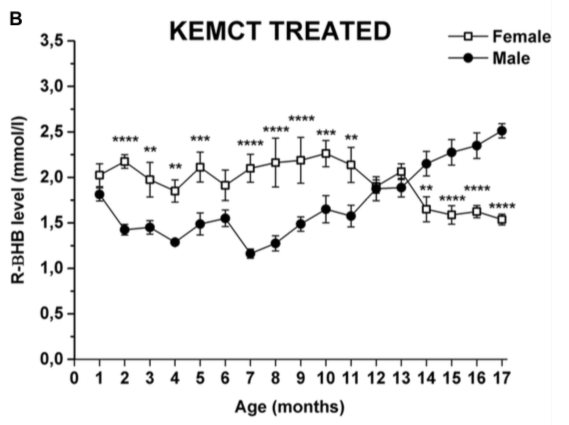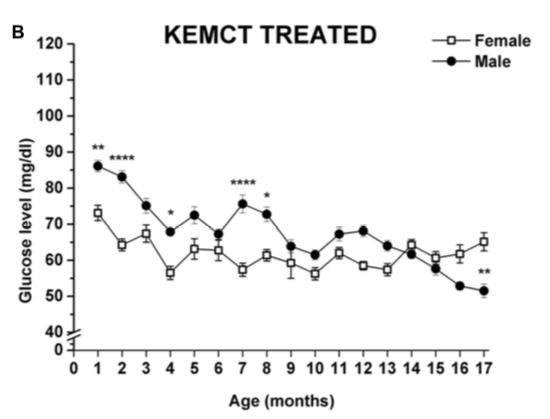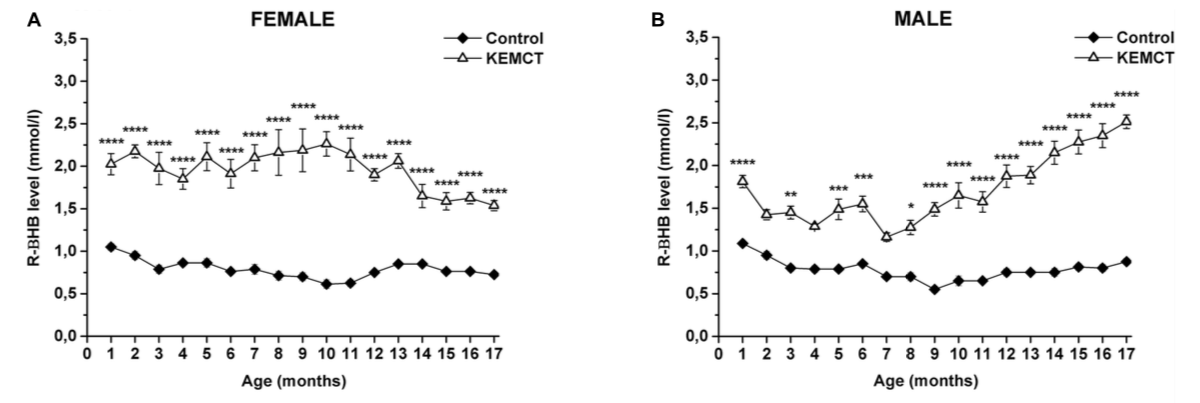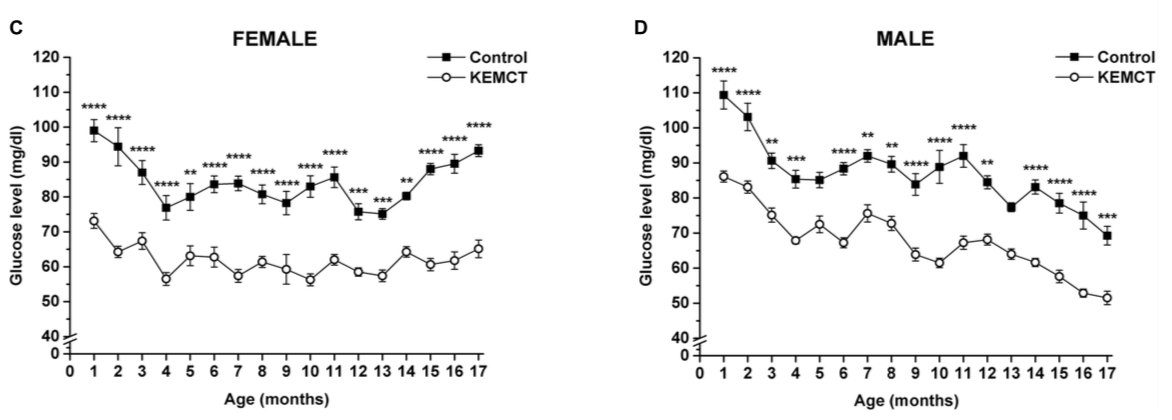 Little research has addressed whether age and gender impact how the body may respond to exogenous ketones, until now. Our latest manuscript focused on a project examining this important and neglected topic.
Little research has addressed whether age and gender impact how the body may respond to exogenous ketones, until now. Our latest manuscript focused on a project examining this important and neglected topic.
There are telling signs in the literature dating back to the 1970s suggesting that women and men may respond differently to a metabolic intervention and that this may be further modulated by age. For example, women experienced a more rapid increase in blood ketones and decrease in blood sugar during a short-term fast, compared to men. Studies on animal models also have shown that the enzymes involved in ketone body utilization change throughout the lifespan. In one of our earlier study we have also demonstrated in rats that exogenous ketone-induced lowering of blood glucose varies between age groups.
This means that the therapeutic effects of nutritional ketosis may be age- and gender-dependent. These may influence their application when it comes to different diseases, which has been observed before. It’s been shown that a ketogenic diet improves physical and cognitive recovery after a traumatic brain injury in young, but not older rats. The ketogenic diet also appears to have a stronger antiepileptic effect in younger animals and children than adults.
All of these previous results inspired us to ask whether age and gender influence how the body may respond to exogenous ketone supplements.
How age and gender influence ketone body and blood sugar levels following the ingestion of exogenous ketones?
In our recent investigation, we addressed these very questions.
We took a group of rats of both genders and administered exogenous ketones (2.5g/kg) once a month over 17 months, beginning when the rats were one month old. Blood ketone and glucose levels were measured one hour after administration of ketones. In this study, the exogenous ketone used was a ketone ester (acetoacetate diester) in a 1:1 mixture with medium chain triglyceride (MCT).
The results showed that age and sex significantly influenced blood ketone and glucose levels. Compared to males, between the 2nd and 11th months, the female rats had significantly higher blood ketone levels, but lower levels from months 14 and onward. The overall finding for ketones was that the increase in blood ketones continued to trend upward as the male rats aged, but not the females. In other words, younger females had higher blood ketone levels than younger males, but this reversed later in life.

KOVÁCS Z, BRUNNER B, D’AGOSTINO DP AND ARI C (2021) AGE- AND SEX-DEPENDENT MODULATION OF EXOGENOUS KETONE SUPPLEMENT-EVOKED EFFECTS ON BLOOD GLUCOSE AND KETONE BODY LEVELS IN WISTAR ALBINO GLAXO RIJSWIJK RATS. FRONT. NEUROSCI. 14:618422. DOI: 10.3389/FNINS.2020.618422
Inversely related to blood ketones, blood glucose levels were lower in younger female rats, but rose as they aged, while in males, blood glucose continuously trended downwards with age, after exogenous ketone treatment.

KOVÁCS Z, BRUNNER B, D’AGOSTINO DP AND ARI C (2021) AGE- AND SEX-DEPENDENT MODULATION OF EXOGENOUS KETONE SUPPLEMENT-EVOKED EFFECTS ON BLOOD GLUCOSE AND KETONE BODY LEVELS IN WISTAR ALBINO GLAXO RIJSWIJK RATS. FRONT. NEUROSCI. 14:618422. DOI: 10.3389/FNINS.2020.618422
This is the first study looking at the effects of exogenous ketones on blood ketone and glucose levels over long-term and stratifying the results based on gender.
So, why are there differences between younger and older rats, and female or male rats? What do age and sex have to do with this?
Many studies have found that age affects the expression of certain enzymes and transporters involved in ketone and glucose metabolism, that are most likely influencing how well these metabolites get into our tissues, and their metabolism can change with age:
-
Monocarboxylate transport-1 (MCT1) in the blood-brain barrier, responsible for transporting ketone bodies into the brain
-
Activity of the ketone body metabolic enzymes, such as BHB dehydrogenase, succinyl-CoA:3-ketoacid CoA transferase, and acetoacetyl-CoA thiolase
Interestingly, at the same turning point in blood ketones and glucose in the exogenous ketone treated animals, the control animals (untreated) also showed a difference in their blood glucose levels. As a stand-alone, this study confirms findings showing that blood glucose levels are affected by age. In this study, these changes began around 13-14-months old in rats. Specifically, after month-13, the control female rats’ glucose levels trended upward. At month-14, the control male rats’ glucose levels trended downwards. These changes with age likely influenced the changes associated with the exogenous ketones.
These differences may be due to the differences in sex hormones between males and females. For example, testosterone has been found to increase the expression of the ketone transporters MCT1 and MCT4 in skeletal muscle. Female sex hormones can down-regulate the expression of these transporters in the liver. Although these findings don’t necessarily support our results and others, they suggest that sex hormones may be involved.
The bodyweight of females were significantly less than that of males throughout our study, which we thought could have explained the differences in blood glucose and ketones. However, the control group had similar glucose and ketone levels suggesting bodyweight was not responsible.
It is known that changes occur with prolonged ketosis (keto-adaptation) that optimize ketone transport and metabolism, so it is unlikely that the administration of exogenous ketones once a month for 17 months would incur such changes. It is more likely that the changes observed in this study are related to the changes in the expression and activity of ketone metabolizing enzymes and transporters over time. Previous research has found that digestion and absorption of fat changes with age, suggesting one’s response to a ketogenic diet may also change with age. It would be interesting to see how age and sex influence the response to exogenous ketones in keto-adapted individuals.
This study confirmed previous findings that:
-
ketone body and glucose production and utilization are maintained across the lifespan of rats, but may be influenced by age and sex
-
blood ketone and glucose levels may decrease with age
-
baseline blood ketone and glucose levels are similar in female and male rats
This study extends previous results by showing:
-
exogenous ketone induced increase in blood ketones was significant in both genders over 17-months, compared to control
-
the rate of increase in blood ketone levels was sex-dependent
-
the effects of exogenous ketones on ketone levels changed by age only in male rats, when compared to baseline
-
exogenous ketones significantly increased blood ketone levels and decreased blood glucose levels in both sexes at all time points, compared to controls
-
the rate of blood glucose decrease was also gender-dependent
All of these findings suggest that different doses of exogenous ketones and different blood ketone levels may be needed to be an effective treatment depending on the age group and gender, but ultimately, more research is needed!
Summary
To wrap it up, emerging research on metabolic therapies, including the use of exogenous ketones, suggests that nutritional ketosis has the potential to improve quality of life and treat several neurometabolic and age-related diseases. It appears that exogenous ketones affect female and male rats differently and that these differences are also influenced by age. These differences should be taken into consideration when using such treatments for metabolic-based therapies. Finally, because the research is mostly limited to animal models, monitoring blood ketone and glucose levels may be necessary to ensure safe and effective doses of exogenous ketones for different age groups and genders.
We look forward to future research that will help understand the exact mechanisms causing these changes associated with exogenous ketones, and more importantly, how this research may translate to humans!
Written by: Kristi Storoschuk; Edited by: Dominic DAgostino, Csilla Ari Dagostino


